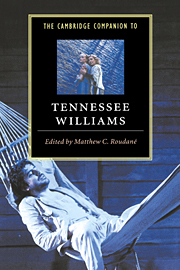Book contents
- Frontmatter
- Introduction
- 1 Early Williams
- 2 Entering The Glass Menagerie
- 3 A streetcar running fifty years
- 4 Camino Real
- 5 Writing in “A place of stone”
- 6 Before the Fall -and after
- 7 The sacrificial stud and the fugitive female in Suddenly Last Summer, Orpheus Descending, and Sweet Bird of Youth
- 8 Romantic textures in Tennessee Williams's plays and short stories
- 9 Creative rewriting
- 10 Seeking direction
- 11 Hollywood in crisis
- 12 Tennessee Williams
- 13 Words on Williams
- 14 The Strangest Kind of Romance
- Selected bibliography
- Index
3 - A streetcar running fifty years
Published online by Cambridge University Press: 28 May 2006
- Frontmatter
- Introduction
- 1 Early Williams
- 2 Entering The Glass Menagerie
- 3 A streetcar running fifty years
- 4 Camino Real
- 5 Writing in “A place of stone”
- 6 Before the Fall -and after
- 7 The sacrificial stud and the fugitive female in Suddenly Last Summer, Orpheus Descending, and Sweet Bird of Youth
- 8 Romantic textures in Tennessee Williams's plays and short stories
- 9 Creative rewriting
- 10 Seeking direction
- 11 Hollywood in crisis
- 12 Tennessee Williams
- 13 Words on Williams
- 14 The Strangest Kind of Romance
- Selected bibliography
- Index
Summary
The thirty-two-cent United States postage stamp commemorating Tennessee Williams, issued in 1996, features a portrait of Williams in a white linen suit against a twilight sky and, in the background, a streetcar. The choice of the streetcar as the only element in the design that can be specifically tied to one of Williams's plays testifies to the centrality of A Streetcar Named Desire in his dramatic canon as well as in the American cultural consciousness. Whether or not A Streetcar Named Desire is Tennessee Williams's “best” play, or even his most performed play, it is probably the one most closely identified with the dramatist, and it is certainly the one that has elicited the most critical commentary.
When A Streetcar Named Desire premiered at the Ethel Barrymore Theater in New York on December 3, 1947, Tennessee Williams was essentially known to the public for one other play, The Glass Menagerie, which had ended a 561-performance run at New York's Playhouse Theater just sixteen months earlier. The elegiac tone and coming-of-age crises of The Glass Menagerie did not prepare theatregoers for the searing adult drama of A Streetcar Named Desire, with its references to unspeakable aspects of sexuality. Indeed, one reviewer called it the product of an “almost desperately morbid turn of mind,” and another found it “not a play for the squeamish.” And yet, it was recognized as “an enormous advance over that minor-key and too wet-eyed work, The Glass Menagerie.” It fulfilled the promise of the earlier work and catapulted Williams to the front rank of American dramatists. A Streetcar Named Desire ran for 855 performances and became the first play ever to win all three major awards, the Pulitzer Prize, the New York Drama Critics' Circle Award, and the Donaldson Award.
- Type
- Chapter
- Information
- The Cambridge Companion to Tennessee Williams , pp. 45 - 66Publisher: Cambridge University PressPrint publication year: 1997
- 4
- Cited by



